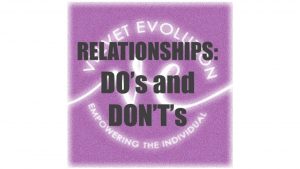Relationship Do’s and Don’t’s

Relationships are a mixed bag.
There will be good and not so good bits.
There will be tears of joy, and tears of sadness.
So what can you do to help yourself and your relationship navigate the highs and lows of life?
RELATIONSHIP DON’T’s:
- Try to be someone different or think, ‘they’ll like me if…’, or ‘I will be this other person if I’m with them’.
- Lie. Just don’t do it, it never ends well, and if you feel you need to lie, then ask yourself why. Either your behaving in a way you know you shouldn’t be (against your own moral compass), or you’re afraid your partner wouldn’t accept you for who you really are, so you’re being someone you’re not, and so the relationship is already doomed.
- Be negative / criticise – even if you don’t think something will work, let them try it and find out for themselves. Then be there to help them pick up the pieces at the end, without saying ‘I told you so’; (it’s antagonistic, and makes you a ‘dick’).
- Try to win. There is no winning or losing in a healthy relationship, just support, understanding and compassion towards each other.
- Over compromise. You shouldn’t always be the one making the compromise. If you are, then you are being someone you are not and that is not sustainable. Your partner must be able to compromise too. Some times it should go your way and sometimes it goes theirs. And if you don’t comprimise, start!
- Be defensive. If you’ve made a mistake, and you will, admit it, say sorry and move on. Don’t be blameless, ‘Nothing I do is ever right for you’, that’s a form of defensiveness, just as much as blame, being argumentative and stonewalling are. Stonewalling is going silent, walking away, not engaging in difficult conversations.
RELATIONSHIP DO’s:
- Be your authentic self. If you don’t know who you are, you shouldn’t be in a relationship. If you think being in a relationship will make you into someone you dream of being, you shouldn’t be in a relationship. If you know who you are but are struggling to have that version of you accepted, you need to question the health of the relationship. If you are happy with who you are and you can be that perosn with your nearest and dearest, then that’s who you should feel comfortable being, and be accepted as being, in your relationship.
- Be honest, without being mean. Being honest is a skill and a challenge. It can feel very scary to be honest as you are making yourself vulnerable by perhaps asking for what you want and of course that means you are open to rejection. But being honest goes hand in hand with being your authentic self.
- Build each other up. Being in a relationship is going to change you, but this should be a softening of the edges, not a fundamental personality, hobbies or interests shift. Being in a relationship is about building each other up. Being supportive whether you agree or not. It’s wanting the best for each other, without jealousy, contempt, or criticism. It means risking that they may fly off without you, but trusting that they won’t. And if they do, then the relationship had run it’s natural course and as painful as it is, it’s time to let it go.
- Listen. Start every difficult conversation agreeing who is going to speak first. If it is your partner thne hear what they have to say with compassion. Listening is active, not passive. Take notes if you need to, understand that what they say may trigger you, but you will have you turn to speak, and your partner will be a better listener if they’ve already had the opportunity to speak. Don’t try to fix their problems unless they specifically ask you too. Learn to be a sounding board, and ASK not TELL!
- Say sorry. And if it is your partner who is saying sorry and you accept their apology then you can’t return to it at a later date. So either accept the apology and move on wholeheartedly, or don’t accept the apology until you are able to do so honestly.
- Be thoughtful in small everyday ways. Make a cup of tea, be helpful, be kind in your words and actions, clear up after yourself. The small everyday things we do for each other are like tiny foreplay tokens and they all add up to better compassion, connection and intimacy.
I hope you find this useful, and please feel free to leave any comments or questions, or get in touch to book an appointment.
Lydia – The Confidence Coach
